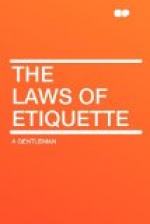Let not any man imagine, that he shall easily acquire these qualities which will constitute him a gentleman. It is necessary not only to exert the highest degree of art, but to attain also that higher accomplishment of concealing art. The serene and elevated dignity which mark that character, are the result of untiring and arduous effort. After the sculpture has attained the shape of propriety, it remains to smooth off all the marks of the chisel. “A gentleman,” says a celebrated French author, “is one who has reflected deeply upon all the obligations which belong to his station, and who has applied himself ardently to fulfil them with grace.”
Polite without importunity, gallant without being offensive, attentive to the comfort of all; employing a well-regulated kindness, witty at the proper times, discreet, indulgent, generous, he exercises, in his sphere, a high degree of moral authority; he it is, and he alone, that one should imitate.
CHAPTER VI. LETTERS.
Always remember that the terms of compliment at the close of a letter—“I have the honour to be your very obedient servant,” etc. are merely forms—“signifying nothing.” Do not therefore avoid them on account of pride, or a dislike to the person addressed. Do not presume, as some do, to found expectations of favour or promotion from great men who profess themselves your obliged servant.
In writing a letter of business it is extremely vulgar to use satin or glazed gold-edged paper. Always employ, on such occasions, plain American paper. Place the date at the top of the page, and if you please, the name of the person at the top also, just above the ‘Sir;’ though this last is indifferent.
In letters to gentlemen always place the date at the end of the letter, below his name. Use the best paper, but not figured, and never fail to enclose it in an envelope. Attention to these matters is indispensable.
To a person whom you do not know well, say Sir, not ’Dear Sir.’ It formerly was usual in writing to a distinguished man to employ the form ‘Respected Sir,’ or something of the kind. This is now out of fashion.
There are a great many forms observed by the French in their letters, which are necessary to be known before addressing one of that nation. You will find them in their books upon such subjects, or learn them from your French master. One custom of theirs is worthy of adoption among us: to proportion the distance between the ‘Sir’ and the first line of the letter, to the rank of the person to whom you write. Among the French to neglect attending to this would give mortal offence. It obtains also in other European nations. When the Duke of Buckingham was at the court of Spain, some letters passed between the Spanish minister Olivez and himself,—the two proudest men on earth. The Spaniard wrote a letter to the Englishman, and put the ‘Monsieur’ on a line with the beginning of his letter. The other, in his reply, placed the ‘Monsieur’ a little below it.




